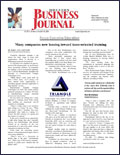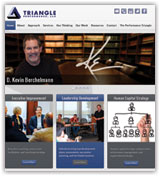|
From the Top
 I still hear people speaking about 2013 as if "it's about to get started." I still hear people speaking about 2013 as if "it's about to get started."
Though I hate to throw cold reality on a warm, comforting ideal, it's June now, and we're almost halfway done with the year.
Revisit goals and objectives. Take a close look at those things that are struggling to get off the ground--you're starting to run out of runway. How are your people doing? Are we holding them and ourselves accountable for specific goals and accomplishments this year? If so, take some time to check on "percentage completion;" better now than a sad song in December.
Speaking of holding folks accountable; there's an article below that speaks directly to the issues and challenges of performance management. Take it to heart.
If I can help with the coaching, leadership development, compensation planning, or strategy parts of your now-high-speed efforts, you know how to reach me.
Save the dates!
Tuesday, August 20th 8:00-9:30am is Leadership 20-20, a by-invitation breakfast overview of what we can expect--trends, forecasts, best guesses--for leadership during the upcoming 5-10 years. Exclusively for C-level leaders, it will be held at the J.W. Marriott here in Houston, and I'm buying breakfast.
 This session will be a timely, informative, professional event with a fairly intimate group of senior executives. Invitations go out soon; if you fit the description (or want someone who does to attend), just drop me an email or give me a call and I'll make sure an invitation goes out. This session will be a timely, informative, professional event with a fairly intimate group of senior executives. Invitations go out soon; if you fit the description (or want someone who does to attend), just drop me an email or give me a call and I'll make sure an invitation goes out.
Thursday, September 5th is Foundations of Successful Leadership, the kickoff session for our Pathways to Leadership 6-session program. This is the same high-level facilitation as my in-house engagements (without the homogeneity of the same group/company), and open to the public. 8:00am until noon at the Woodlands Marriott. There will be a participant fee, but I'll throw in breakfast to make it a deal. More details coming...
On Stage...!
| This month's video: Developing People. I describe in plain language the simple process behind developing people. It's neither cumbersome nor complicated, though sometimes appears that way when described or attempted by those who just don't know. |
 |
Know thyself; our first awareness must be self-awareness. Click here to take and receive a complimentary Personality Assessment. If you took it before and didn't receive the results, we've "fixed the glitch," so take a few minutes and try again.
He speaks... (apparently I have a message that resonates with some... who knew??)
I recently spoke to a senior staff on Change: The Leadership Imperative. As leaders, I believe we're slowly warming up to the idea that "change management" and "leadership" are synonyms; leading change is becoming less and less a discrete process independent of leadership efforts..
I also facilitated another executive group (senior staff) on Trends, Challenges, and Executive Impact. Sounds easy... lots of places to trip. Really good session.
In the News!

My Houston Business Journal feature covering my firm (and a large, multi-year client) for an article on team-centric executive development. |
 |

Fortune, Fortune Online's information website, recently quoted in article "Boom or Bust? Taking the brutality out of brutal honesty"
I continue to present on various topic, one in particular:
Leadership is Easy... until it isn't.
Successful leadership in challenging times...
If you'd prefer another topic for your event, let me know (and give me enough time to make something up to impress you--you won't be disappointed).
If you have a corporate or association event, I'd certainly enjoy speaking to your group. You can see more information regarding topics and details on my website.
Further, feel free to download and read a few articles that may be relevant:
CEO & Leadership Style When Private Equity Comes Aboard,
Leadership Success or Failure... Avoiding Organizational Incongruence, and
Getting Communications Right... Don't Overthink This Stuff
 Have you visited my website recently?. Check back often, as this new site replaces my regular blog as well, so I update content several times each week. If you would like me to address a specific topic or content, email and tell me. I'll see what I can do (your chances are good; surprisingly, I have opinions on most everything--that's a shocker). Have you visited my website recently?. Check back often, as this new site replaces my regular blog as well, so I update content several times each week. If you would like me to address a specific topic or content, email and tell me. I'll see what I can do (your chances are good; surprisingly, I have opinions on most everything--that's a shocker).
Are you social? Like me on Facebook, follow me on Twitter, or connect with me on LinkedIn.
If you'd like to know how I can assist you, your organization, or a colleague of yours, please fill out this form and I'll send you some specific information, articles, engagement results, and so forth.
As always, I hope this finds you well, personally and professionally; please give me a call if I can ever help in any way, and feel free to forward this to anyone you feel may be interested. (Really!) I appreciate your referrals.
Warm Regards,

D. Kevin Berchelmann
President
Triangle Performance, LLC
www.triangleperformance.com
kevinb@triangleperformance.com
281.257.4442
|

